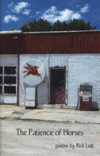The Patience of Horses
Lott’s chapbook of 16 poems, the majority of which appeared previously in a variety of journals (Texas Review, Mid-America Poetry Review, and Crazy Horse, among others), is the winner of The Ledge 2009 Chapbook Award. I happened to be reading Lott’s book while the debate over the “cleaning up”/“contemporizing” of Mark Twain’s language was being played out in the press (like most items in the “news,” any mention of it quickly disappeared), so I was particularly interested in the chapbook’s opening poem, “Passage,” with its description of a “Negro church”:
Lott’s chapbook of 16 poems, the majority of which appeared previously in a variety of journals (Texas Review, Mid-America Poetry Review, and Crazy Horse, among others), is the winner of The Ledge 2009 Chapbook Award. I happened to be reading Lott’s book while the debate over the “cleaning up”/“contemporizing” of Mark Twain’s language was being played out in the press (like most items in the “news,” any mention of it quickly disappeared), so I was particularly interested in the chapbook’s opening poem, “Passage,” with its description of a “Negro church”:
What force drew the nightcrawlers
out of the blind earth on the lawn?
My grandfather knew, and never
missed a chance to tell you so.
I went with him one Sunday
to a Negro church in the country,
he behind the podium and I
slumped in the front row, clutching
a songbook limp as a bundle of rags.
He preached of burning tares,
and sparrows sold two for a penny
that fell not to the ground
except for the Father’s will,
quoting from his big black Bible,
as fluently as if he had written it.
And the amens flew up like starlings
to light among the resinous rafters.
Squeezed against me, an old woman
whose moist black face shone black
as the light from grandpa’s polished shoes.
Lott’s strength is the ability, as he does here, to create a specific time and place, an atmosphere particular to a narrow and specific milieu and moment. The title poem recreates the exact and unique physicality of horses in the rain (“The horses steam in slow rain. / All day long they have stood / like great boulders in wet-light, / their rubbery lips nibbling / brown wisps among the stones.”). In “The Farm,” the poet recreates, with the same attention to the precise atmosphere of a moment, the child’s experience of bedtime in winter (“Winter bedtimes, my brother and I / warmed before the fire, then raced / down the hall to burrow under / a burden of layered quilts. / Our shivering breath rose / as vapor in the starlight.”). In “The Watchers,” he paints an evocative picture of a languid summer night in the country (“Those endless nights we hung around / The Mobil station at the edge of town, // Propped up on Coke flats against the wall, / We breathed the ancient grease and diesel. / /Random cars left behind only wind, / That fanned sedge beside the pavement.”). I liked especially “The End of the World,” a lovely and gentle narrative of what did, indeed seem like the end of the world as Lott explores it:
…Scrub pines seethed in the wind,
And gulls quarreled
As I followed the debris at strand line:
Starfish, seaweed, broken shells.
The ground swell of a distant storm
Crashed on the sand, gnawing
The narrowing beach.
I searched the flotsam
For anything lost: coins, ambergris,
The glass globes torn from fishing nets.





